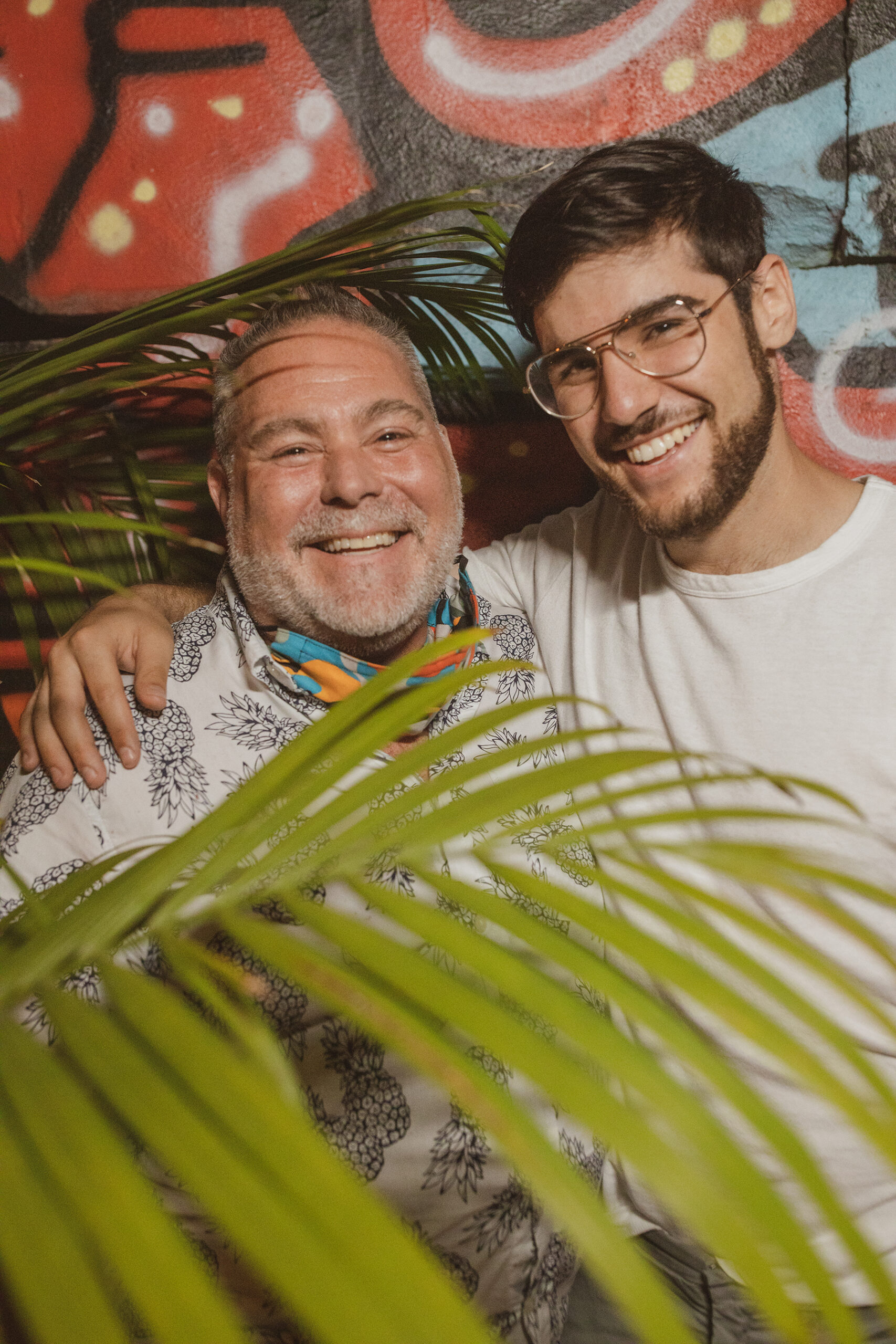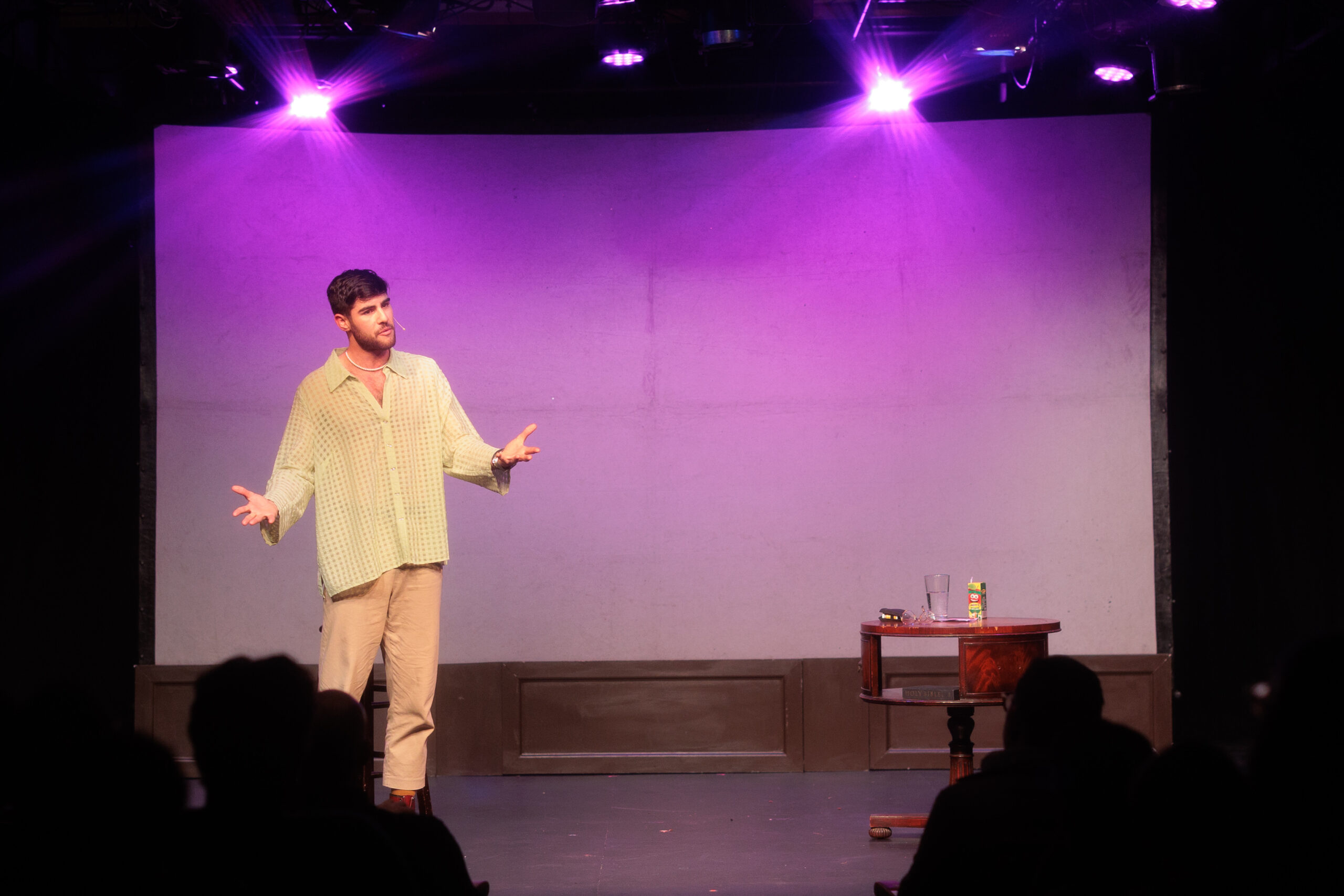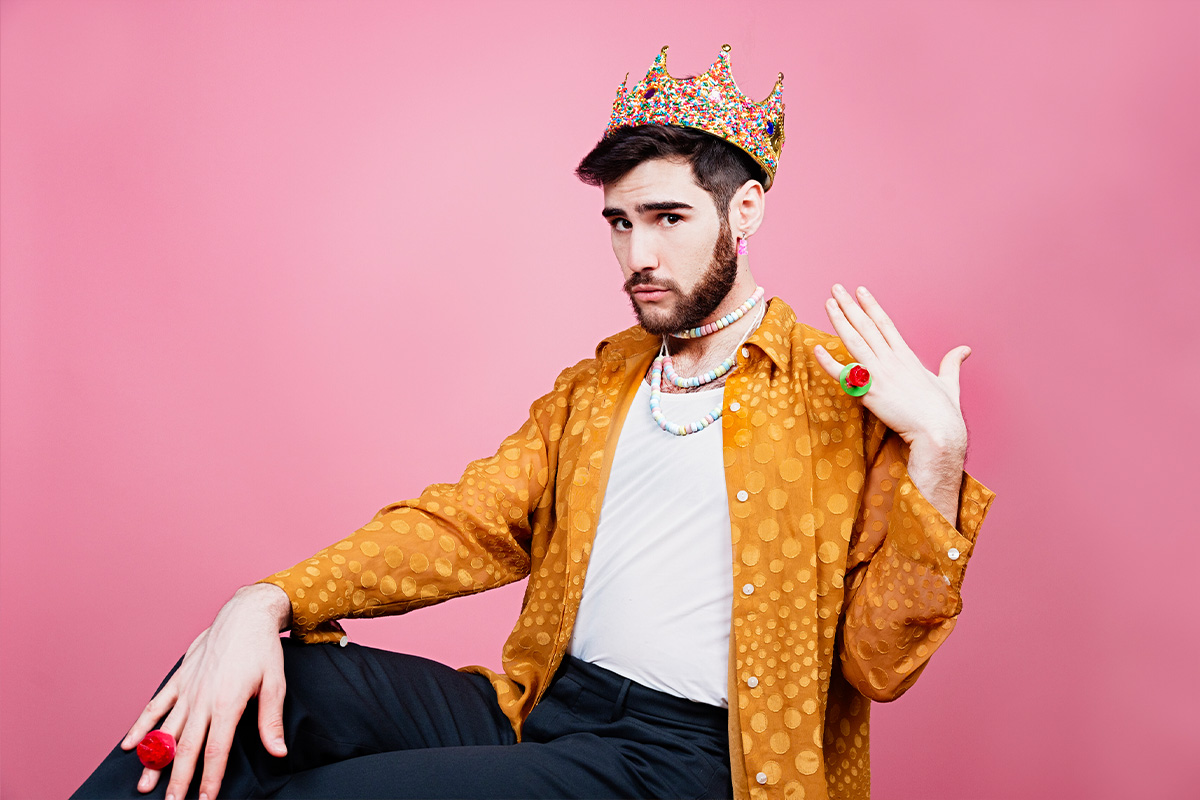The saying goes that comedy equals tragedy plus time. (In essence, that laughter and jokes arise from past moments of sadness.) There are few comics I’ve encountered for whom this statement is more true than for Jewish comedian Sam Morrison.
In 2021, Sam’s beloved partner Jonathan passed away from COVID-19. Just a short while later, Sam was diagnosed with Type 1 diabetes — something his doctor suggested could have been brought on by grief. Then, as if those events weren’t traumatic enough on their own, Sam was mugged.
Now, Sam is making his Off-Broadway debut with the show “Sugar Daddy,” an hour of stand-up which, in the great Jewish tradition of using humor as a coping mechanism, shares his love of Jonathan and subsequent loss, diabetes diagnosis, mugging and accounts of a seagull attack and being proselytized to in unexpected ways. (I swear it’s somehow only an hour despite all that content!) In the same way that Sam is in a category of his own for discussing such fresh tragedy onstage, his writing and performance in “Sugar Daddy” are also exceptional. It’s a show which brilliantly interweaves moments of full body laughter, deep poignancy and, ultimately, the triumph of life.
I chatted with Sam about “Sugar Daddy,” the Jewishness of using humor as a coping mechanism and watching his own bris on VHS.
This interview has been lightly edited and condensed for clarity.
Could you tell me about your Jewish identity and background?
I grew up in Sarasota, Florida and we had a community, although we were certainly the minority there. But I went to a Jewish temple preschool, and I went to Hebrew school. Eventually I got bar mitzvahed — actually in Israel at the Western Wall, which was sort of always my mom’s dream. I just wanted a party.
Oh my God, same. My mom was like, “Do you wanna have your bat mitzvah in Israel? And I was like, “No, I want to do the ‘Cha Cha Slide’ with my friends.”
I wanted to say no, but I don’t think I had a choice. But yeah, we celebrate the holidays, and are culturally Jewish on both sides of my family going back many generations.
In “Sugar Daddy,” you describe yourself as an anxious gay diabetic Jew. That’s quite a lot!
[Sarcastically] Well, first of all, you forgot asthmatic and that’s problematic.
You’re right, I’m so sorry.
It feels chaotic. I guess you kind of identify with one [part of yourself] or another, based on how you’re feeling and listening to your body and your mind. I just got diagnosed with diabetes, so I feel like I’ve rapidly discovered that there is a big community there. Lately, I’ve just been learning a lot about that, and tapping into that community. And what’s funny is that I never really celebrated the Jewish holidays. Jonathan wasn’t religious either, but he was also Jewish. So we would always do our own little holiday celebrations together. So yeah, I just think that at different points in your life it makes sense to identify with one [part of yourself] or another.
For those who haven’t seen the show, could you share a little bit about Jonathan?
One of his coworkers came to the show recently and described him as just a beaming light. When Jonathan was in the room, people were just lighter and happier. He smiled a lot and he had an infectious big laugh. He was a Jew from Atlanta and he built his community in New York City where he lived for the past couple decades. And then I met him at Bear Weekend in P-Town – actually I met him at Spooky Bear, which is the gay bear festival over Halloween. In the show, I kind of combined two of my trips to Provincetown into one. But yeah, we started dating shortly thereafter.

Thank you for sharing that. At what point in your grief and healing process did you realize that you needed to write this show?
You know, I was using humor the whole time. I would call my best friend and we would just talk and laugh a lot and make jokes. I mean, obviously, that wasn’t the majority of the conversation, but there was humor in it. And it’s also just part of the way that I processed the world. I don’t think there was ever any doubt that there is comedy in a tragedy, but I don’t really know the timeline. Maybe like six or seven months after he passed, I tried doing jokes about it for the first time. And it was somewhat helpful. Then I put it on the shelf for a while, and then I tried to just talk about it from a different angle.
Basically, it felt inevitable for me [to write this show], because I write what I am going through and what I’m thinking about. I’ve always told personal stories in my comedy, and I just knew that I needed to talk about it on stage. But I never forced it. There were different times that I did it, and it wasn’t helpful. And I stopped doing it. There were other times that I did it, and it was incredibly helpful. It felt like a huge breakthrough for myself — and I mean, artistically, yes, to get these jokes to work on stage has been very, very difficult. But from a grief perspective, it really helped me move forward, to be able to talk about it and share myself and my journey.
To me, using humor as a coping mechanism is a very Jewish thing. Do you feel that way as well?
I didn’t even notice it until my friend said how Jewish it is to do this show. But it is. We’re a traumatized people, and we love to talk about it. That’s the first joke in the show. My doctor was like, “Diabetes is an invisible disease. So you have got to talk about it.” And I was like, “You must not be familiar with my people. There aren’t a lot of perks to being a gay Jew, but if you’re telling me the cure to diabetes is complaining, it’ll be gone in a week.” And it’s kind of true when it boils down to it. And if there is any help for grief, it’s really just kind of bitching about it.
In “Sugar Daddy,” you also talk about things that people say to mourners that you find unhelpful. Jews typically say, “May his/her/their memory be a blessing.” Was that unhelpful to you in your grief as well?
Nothing was helpful. What was helpful was community, finding other people who have been through this and just talking about it. And even that, it really wasn’t that helpful. But people would say all kinds of things and most of the time I would just either jot them down and be like, “Let’s make fun of them on stage later,” or just let it go by.
One joke that I can’t stop thinking about is that you and Jonathan watched a VHS tape of your bris together. What was it like watching your own bris? And did it bring you closer as a couple to watch it?
It was too low quality. I couldn’t see anything. I was honestly shocked that it was recorded.
Yeah, I’ve never heard of that happening.
Really?
I know people film bar or bat mitzvahs, but not a bris.
Yeah, well… my family’s different. But the video wasn’t actually of the procedure. I think they filmed a little celebration afterwards. But I honestly have no idea. I’ve never been to a bris party.
I don’t want to give too much away about the show for our readers, but I need to ask: For the bit about proselytizing, how did you get the idea to give Jehovah’s Witness pamphlets to the audience?
It was like two days before the show, and I was like, “Wouldn’t it be hilarious if I did that?” I don’t know if it worked, but I love a long con joke. If people come in to [the show after being handed a pamphlet] they’re going to be confused, talking about it, and then hopefully, during the show they’ll go “Oh, that motherfucker. That’s what the Jehovah’s Witness pamphlets are for!”

You make a joke in the show about how something that might help your grief is winning an Emmy. Is your goal for “Sugar Daddy” to become a taped special?
I feel like if people just read that on paper, that’s not going to look great. I just want to be clear: That is sarcasm. But yeah, honestly, this Off-Broadway run has been a dream. And this is a goal in and of itself. I would love to sell this as a special and see where it goes. As proud as I am of where it is right now, it’s actually a pretty new show. I haven’t even been doing it for years. So I think there’s more growth to do and more to learn about what this show is and what it could be. I’m excited for whatever the next step is.
Have you thought about what it will mean to not perform “Sugar Daddy” anymore?
When I did it at the New York Comedy Festival, I knew there was a chance that it would be the last time that I did it. I was pretty sad about that for a bunch of reasons, but mostly that it is very helpful for me to do. I don’t want to stop doing it. Obviously, grief is such a long process, and it’s not ever going to be fully processed. But I’m still really enjoying doing this. I also kind of thought that when I went to Edinburgh, and did it 28 times in a row, that I would never again because I would be like, “OK, that was too much.” But the more I did it, the more I felt comfortable talking about it and sharing it. And when people talk about how the show has helped them, and they connected to it, I’m like, “Oh, this does have value.” And I know that might sound like me being coy, but it is hard. Something that I struggle with is seeing real value in my art beyond — I mean comedy is valuable in and of itself, because it’s entertainment. But beyond that, there is a community aspect to it. There is a catharsis aspect to it. If I can create something that other people who are going through this thing which feels like nobody understands can connect to, then that’s something that I’m really proud of, and I really want to keep doing it.
“Sugar Daddy” is playing at the SoHo Playhouse through February 17, 2023. You can buy tickets here.



